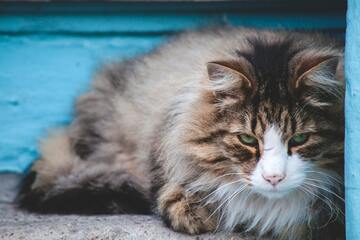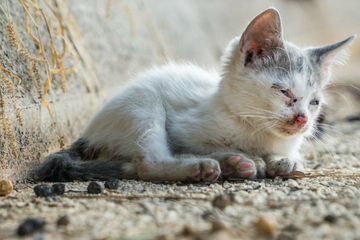How to get rid of cat fleas: Spotting an infestation and treating it with home remedies
Cat fleas are particularly unpleasant little buggers and, if left untreated, can make your feline friend very sick. There are a few home remedies to help you out in the case of a flea infestation, so let's take a look at how to get rid of cat fleas, and what danger signs you should look out for.
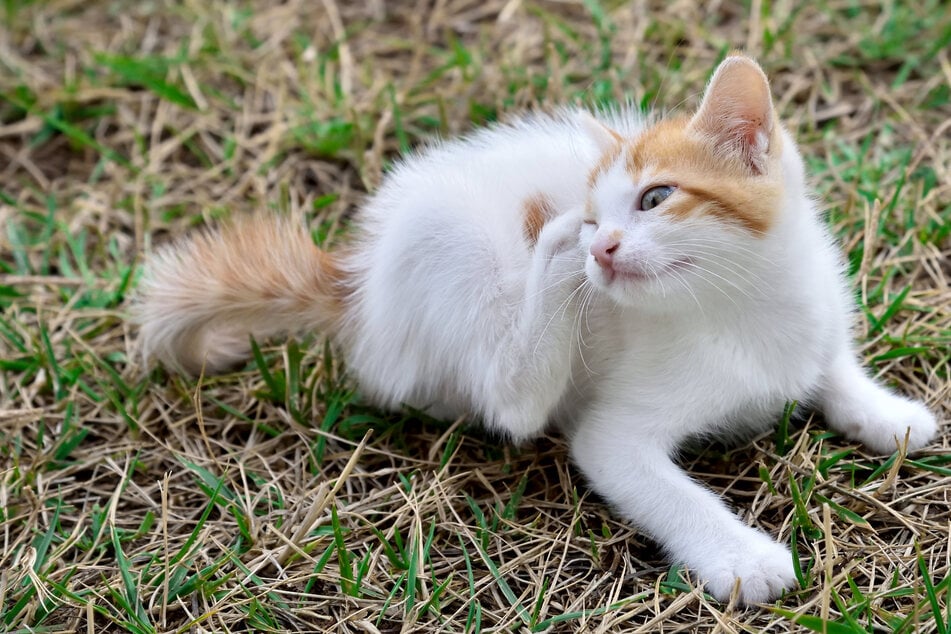
Cat fleas are one of the most common parasites to infect our beloved pets. They're nasty little things, nesting on their fur and skin and feeding on tiny skin particles and blood. If left untreated, these critters can cause serious health problems, both physically and psychologically.
Outdoor cats will probably bring home fleas at least once in their lifetime, which can have a wide-ranging impact if it turns into a household infestation that will affects humans. It's a serious and very unpleasant pain.
As usual, though, the TAG24 cat guide is here to help you out! We dive into how you can get rid of cat fleas, what to look out for, and the steps you can take to prevent an infestation in the first place.
On the run? Here's a quick TL;DR:
- Typical symptoms of a flea-stricken cat include itching, skin sores, and small black dots in its fur.
- You should seek professional medical treatment from your vet in the case of an infestation. Flea collars and flea combs are also your best bet to get rid of them.
- There are a variety of effective anti-flea sprays that can be made quickly from household ingredients.
- Prevent fleas with proper hygiene and consistent anti-flea treatment.
How to tell if a cat has fleas
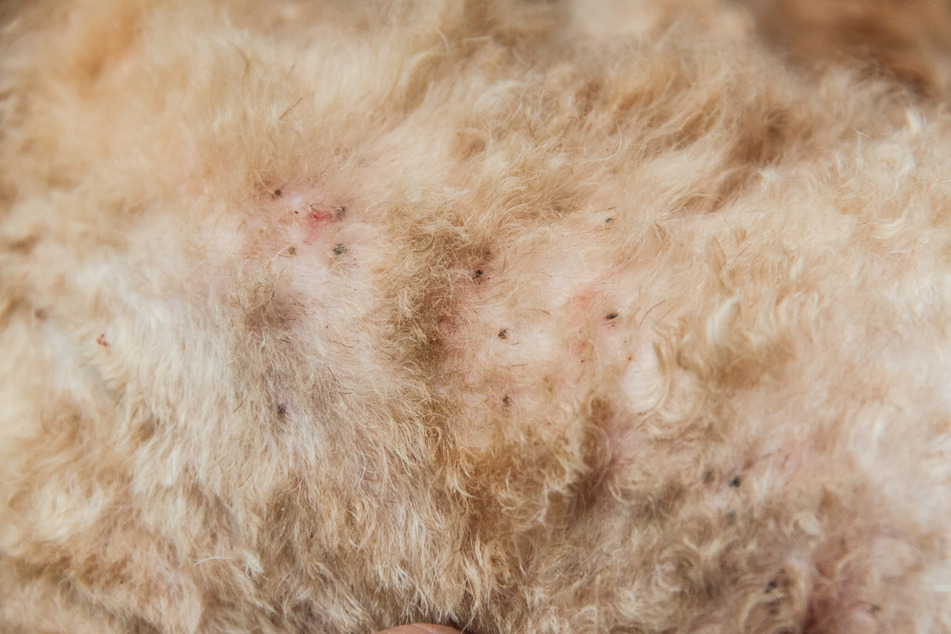
Cat fleas are absolutely tiny, so it's hard to see with the naked eye (we'll get into that in a minute). Since they're only a few millimeters in size, it can be much easier to watch for symptoms of a flea infestation rather than the little critters themselves.
Here is a selection of flea bite symptoms in cats:
- Itching: Flea bites leave small red marks on the skin, which often leads to intense itching. Your kitty will be scratching itself more than Baloo in Disney's Jungle Book, which is pretty hard to miss.
- Skin sores: All that scratching will eventually cause skin abrasions. These can become infected and cause other serious health issues.
- Coat changes: Another consequence of the intense itching caused by flea bites is that your cat's coat can become brittle and start to shed. Bald patches may develop, which is no good at all.
- Allergic skin reactions: Some cats may experience severe allergic reactions to flea bites, as fleas also transmit foreign bodies and diseases. This can result in severe itching, but also swelling, rashes, pustules, and redness.
- Black spots: If you notice tiny black spots on your cat, they're more likely than not to be flea droppings. You might notice that if you crush these crumbs and then moisten them, they turn red. That's because they consist primarily of undigested blood.
- Restless behavior: A flea infestation is seriously unpleasant for your kitty, and will cause it to become incredibly restless, anxious, and irritable.
- Fleas in the fur: However small they may be, you might occasionally catch a glimpse of a flea petting it or may even see them in its fur. Even if you're just seeing slight movement in your cat's fur, it could indicate the presence of fleas.
In general, though, it's best to look out for symptoms, which are much easier to spot.
What do fleas look like to the human naked eye?
Fleas are small parasites that are typically about a tenth of an inch in length (2-3 millimeters). They are wingless, thin, and have brown to reddish-brown bodies. A flea's body is covered in hairs that help it move around on its host. One thing they're famous for is that they jump like hell, which occasionally gives them away.
Cat flea treatments
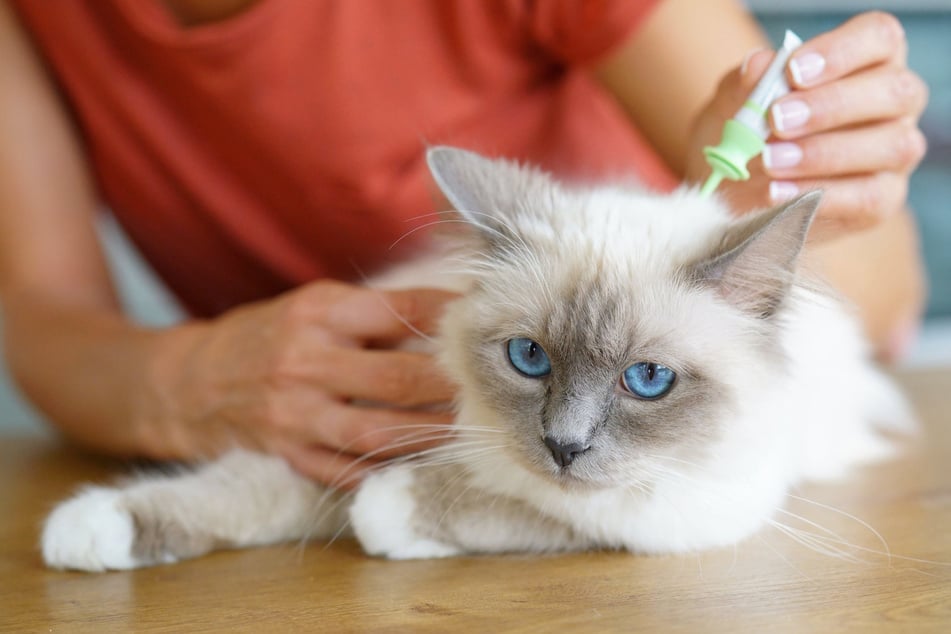
Cats should be treated for any flea infestation, as these parasites not only spread between hosts incredibly quickly, but can cause serious health problems when left to feast.
They can cause the transition of nasty diseases from animal to animal, including worm infections, spotted fever, and meningitis.
Fun fact: It is widely believed that fleas are actually the primary cause for the transmission of the bubonic plague – or the Black Plague – across Europe in the 1340s. The fleas were carried mostly by rats that ended up on merchant ships.
It is vital that you treat not only your cat, but your home and anything that your kitty may have come into contact with.
Here are a few tips and tricks:
- Use spot-on preparations: You apply these drops directly to the cat's skin. Make sure that your pet can't reach the treated area with its tongue – the back of the neck is your best bet!
- Use a flea collar: Pop a flea collar on your feline friend. These devices contain a selection of ingredients that are regularly released in low doses and then spread as a greasy layer across your cat's skin. This kills fleas and prevents new infestations.
- Use a flea comb: Use a flea comb to remove fleas and their eggs, pupae, larvae, and droppings. Yes, your kitty will probably protest. It's worth it though, so put on some gloves, apologize in advance, and comb with the grain to minimize the unpleasantness as much as possible.
If you think your cat has contracted a flea infestation, don't hesitate to contact your veterinarian. To avoid the spread, don't bring your cat in immediately, but call and get advice first.
How to get rid of cat fleas with home remedies
There are a huge variety of home remedies that can help against flea infestations in your cat and home. These essential oils or particular plants are said to put an end to these bloodsucking pests. Let's take a look at a few options and assess whether home remedies are the way to go.
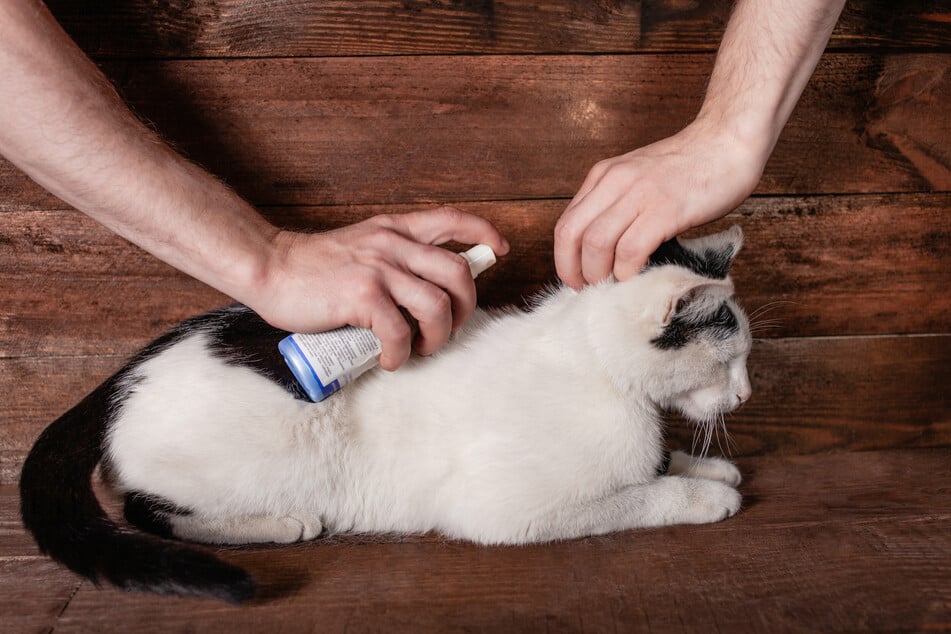
Vinegar and lemon spray
Ingredients and preparation: For this anti-flea spray, mix together 8.5 ounces of water, 50 ounces of household vinegar, and 5 ounces of freshly squeezed lemon juice. Put the mixture into a spray bottle and shake vigorously.
Application: Spray this vinegar-lemon solution on your cat if it has been infested with fleas. Hold your nose and apply it to furniture and clothing too.
Essential oils
Ingredients and preparation: For this mixture, mix together 8.5 ounces of water and a variety of essential oils. Tea tree oil, eucalyptus oil, and lemon oil are particularly suitable, and about 10 drops of each are enough to help with a flea infestation. Add to the water and put into a spray bottle.
Application: Spray the cat carefully with this mixture, making sure to not get it in its eyes.
Keep in mind: Some oils are toxic for cats and shouldn't be used. Check with your veterinarian beforehand or use another option if you are worried.
Rosemary lemon spray
Ingredients and preparation: Boil about 34 ounces of water together with a finely chopped up lemon (including the peel) and a handful of fresh or dried rosemary. Simmer for about fifteen minutes and then leave it to cool for at least two hours, or until cold. Pour the mixture through a sieve to catch the rosemary and add a few drops of geranium or tea tree oil before placing everything into a spray bottle.
Application: Again, apply this spray to your cat as well as any furniture that may be effected. This remedy also works for humans who have been infected. Make sure that you let the mixture soak in for at least 20 minutes before you rinse it out again.
Remember: Home remedies are nowhere near as effective as using a medical solution. We would recommend avoiding home solutions and instead getting medical advice from your veterinarian.
How to prevent fleas on cats and in the house
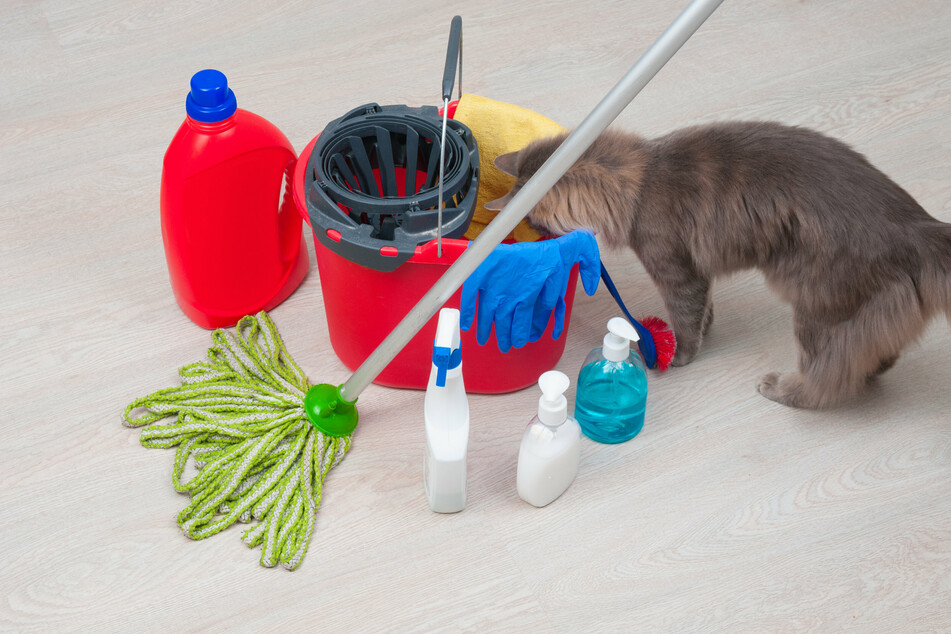
Treating and preventing cat fleas can be a lengthy and difficult procedure, and is often not enough to prevent an infestation. The biggest problem with fleas it that they spread rapidly, infesting furniture, other animals, and even people. As a result, it's best to stop them from making a home in your pet's fur to begin with.
To effectively prevent cat fleas, try these couple of methods:
- Thoroughly clean your apartment regularly.
- Dispose of all vacuum cleaner bags in the garbage immediately after vacuuming.
- Regularly change your bed linen, at least once or twice a week.
- When you wash your bed linen and bedspreads, make sure that the temperature is set to a minimum of 140° Fahrenheit.
- Wash cat beds and blankets regularly, also at 140° Fahrenheit.
- Regularly spray and comb your cat's coat, preferably every day.
- Treat your furniture and scratching posts with an anti-flea spray.
- Place non-washable textiles in the freezer for a few days if you are concerned about a potential flea infestation.
You should regularly treat your cat with anti-flea medication, provided and prescribed by your veterinarian. Follow the instructions and speak with your vet. This is the most important tip.
Cat fleas can be a real pain
Cat fleas can be dangerous, as they are a major transmitter of diseases and nasty infections. That being said, you shouldn't freak out if you get an infestation. It's quite normal and can be treated relatively easily.
Regularly groom your cat, check your cat for fleas, and make sure to take appropriate measures to protect it. If you act on the safe side and regularly consult your vet, then you shouldn't have too much of a problem with these nasty little critters.
Cover photo: 123rf / Zdravinjo
